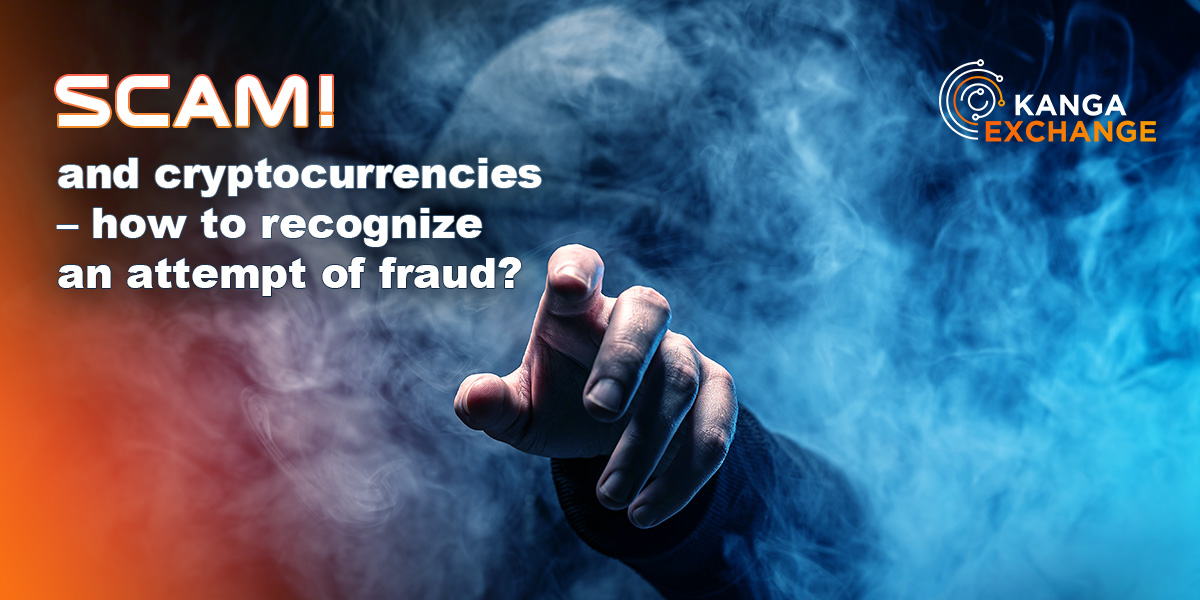SCAM and cryptocurrencies – how to recognize an attempt of fraud?

Written by
Kanga
Published on
SCAM is a specialized type of fraud. It involves luring the victim with a promise of high profits or helping them solve a problem in return for a ‘minor’ fee, their credit card details and even remote access to the computer.
HOW TO RECOGNIZE EXTORTION VIA THE INTERNET?
Whenever we hear about these types of frauds, it quite often causes denial to appear in our minds. ‘I would never fall for that’, ‘You can see right away that it is a scam, only fools can get fooled like this’. I am a victim of a quite sophisticated scam and I have noticed how the processed worked and how naïve I was far too late. However, I cannot describe it yet. It should be stressed that scammers are very creative and come up with new ways of manipulating and getting money out of their victims all the time. The process itself can be described in the following way:
1. Contact – main channels: fake websites, Facebook, phone, Telegram, Discord.
2. Gaining trust– willingness to help, promise of a profit, a winning prize in a competition.
3. Obtaining personal data – credit card details, access credentials, remote access to the computer.
4. Obtaining the money – the manipulated user sends the money or the money is stolen.
5. Building trust once again – maintaining contact, further manipulation.
6. Another attempt at obtaining the money– a promise of higher profits in return for additional money.
7. Vanishing – once the victim loses all money or realizes it is a fraud, the contact is broken.
WHO IS A SCAMMER AND WHAT ARE HIS METHODS OF WORK?
Every person may be a fraudster, however, on a closer look we can notice a certain pattern of with regard to that person. Middle aged, with an eastern accent, a broken Polish language, a kind and calm man who repeatedly guarantees his help or some profit. He sends links to websites, that are strikingly similar to the original ones, payment links or mails that resemble the real ones.
WHO IS EXPOSED TO A SCAMMER ATTACK?
Usually, scammers look for victims who are unaware and are seeking help, fast profits or protection of their capital. These are very young or older people who do not have the knowledge and who are easily manipulated.
WAYS OF PROTECTING YOURSELF AGAINST A SCAM
Unfortunately, each case is very individual, because the fraudsters have become so good at it that they can introduce a company’s real team to the victim in a way that makes them look like fraudsters. These are the basic rules to be followed:
1. No one from the Customer Support team will be the first to reach out to the user via a communicating tool or be the first to call them.
2. No company employee has the right to ask us to give them access to our computer, accounts, passwords, access credentials, be it under the pretext of helping us.
3. We must check carefully the web addresses of websites we are being redirected to.
4. No project will give away big amounts of money in return for sending them smaller amounts.
5. We always have the right to stop the conversation and call the official phone number to the company in order to verify if it was indeed their employee contacting us.
6. Remember that nobody gives away money for free.
7. We sacrifice a lot of time to increase our capital. We must not treat it as valueless and we should reflect upon what risks are connected with every investment.
8. We must assume that each project can be a scam and must check it with any known means, e.g.:
According to the law if we let fraudsters deceive us, we can unknowingly be part of money laundering and terrorism financing. Illegally obtained money may be used later in the laundering process in other places and further be legalized. If we become part of this practice, we may have to face legal consequences.
Kanga Exchange addresses these problems and encourages you to follow a number of blog posts, which describe situations in which a scam was detected.
We warn users against the growing number of scammers and invite you to contact our Customer Support team in order to verify potential fraudsters, who claim to be employees of Kanga Exchange or related projects.
Official contact channels:
+48 58 573 36 33 – customer support via phone
[email protected] – official e-mail for customer assistance
https://t.me/KangaExchange – official news and discussion channel in Polish
https://t.me/KangaExchangeChat – official news and discussion channel in English
Roman Majewski
for Kanga Exchange